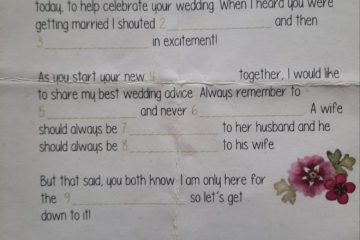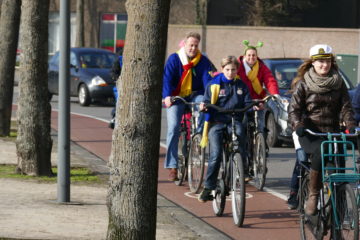Shenanigans is a guessing game that I first learned from my Australian niece, who picked it up during her time at college in the capital, Canberra. Be sure to give this truly fun game a try: it has brought hours of that kind of engaging, fun, laughter filled connection that helps make life so sweet.
Narrative
This game can be easily adapted to almost any celebration. At our most recent Thanksgiving gathering, we played Shenanigans after dinner to howls of laughter. On this day of giving thanks we adapted the game by using “guess words” that were people, places, and things that we were grateful for.
Equipment:
- A stack of 2″ x 3″ paper scraps (at least 3 per player, all the same size and design)
- Pens or pencils
- Two hats or bowls
The Set Up:
- Each player writes a person, place, and thing on three paper scraps (one per paper) and folds them in half.
- All the folded scraps are put into one of the hats.
- Split the group into two large teams that take turns being the”active team” and the “inactive team.”
- One member from each team volunteers to be the timer.
The Play
- Each time a team is active, a different member becomes the Communicator while the rest are “Guessers”.
- When the Timer says “Go!”, the Communicator has one minute to help their team guess as many “guess words” as possible.
- If the Guessers are struggling to find the correct answer, the Communicator can put the paper scrap back in the same hat and select a new “guess word”.
- There are five rounds, with each round using a different communication style:
- Round 1 – The Communicator can use any words except for the “guess word” or any part of it in there clues.
- Round 2 – The Communicator can only use one word.
- Round 3 – The Communicator draws a picture of the “guess word”.
- Round 4 – The Communicator acts out the “guess word” without using words or sounds.
- Round 5 – The Communicator acts out the “guess word” from underneath a bed sheet.
- The “inactive team” will want to listen and watch closely as the rounds get harder each time and remembering the guess words from the previous rounds helps greatly!
- The Guessers can guess as many times as they want within the one-minute time.
- When a Guesser calls out the correct “guess word,” the Communicator says “Yes,” speaks the correct answer out-loud so everyone can hear, and puts the paper scrap in the other “discard hat.”
- Teams take turns being active and score one point for each correctly guessed “guess word” in one minute. When the minute is up, unsolved guesses go back into the same hat so others can try.
- After the last “guess word” is guessed, the clock is stopped. Now the “discard hat” becomes the “active hat” and a new round begins. The clock is restarted and the same Communicator draws a “guess word”, using the rest of their minute in the new communication style.
- Play as many rounds as seem right for the moment, using your best guess to make each successive round a little more challenging. The goal is that rounds progress from easiest to hardest.
Notes:
Versions of this game may also be known as “Fishbowl”, “Celebrities”, and “Name game”.
Some other fun rounds we’ve tried include “Face Only,” “Sound Only,” and “Drawing Without Looking at the Paper” (or drawing with your non-dominant hand). These three would be for later in the game. If you find other rounds that work well please share them here.
This game can encourages the sharing of stories from our lives that arise from “the guess words” each person contributed.
As player are create “guess words” for the game, let them know that it’s fun if there are a mix of simple and more challenging words. Remember all the “guess” words will come up again and again – so it will be easier to this in successive rounds to remember them. For example:
- “Paris, France” is simple to communicate, because most people know the city and some landmarks in the city, like the Eiffel Tower and the Seine River.
- “Nice, France” would be harder because, though many have heard of this city, less people know of it. Still, there are other ways to other ways to communicate it, even if the communicator has never heard of it.
- “Saint Tropez, France” would be quite hard because still fewer people know of this seaside resort but there are other ways also to communicate those words.
- “Aureille, France” probably a little hard for this game because it is unknown to most folks and a challenge to communicate in other ways. Still if you had a good story about the town you might include it and the group would eventually get it.


